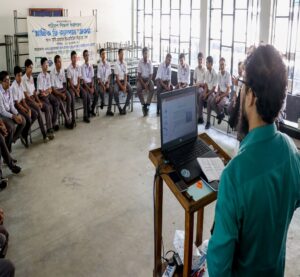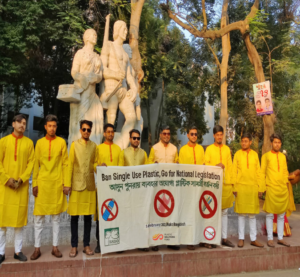According to research by the Environment and Social Development Organization-ESDO, 18 transboundary rivers in Bangladesh transport 2.6 million metric tons of single-use plastic into the Bay of Bengal every year, posing a major threat to river systems, waterways, and people’s health.
The study was conducted by Environment and Social Development Organization-ESDO in collaboration with the Plastic Solutions Fund and the Global Alliance of Incineration Alternatives (GAIA). ESDO presented the report on Sunday at a conference titled “Assessing Transboundary Movement of Single-use Plastic Waste Through River Channels in Bangladesh and Dialogue on the Upcoming Global Plastic Treaty” at a city hotel.
The entire event was divided into two segments. The first segment was to launch the report, and the second segment was to have an elaborate discussion on the upcoming Intergovernmental Negotiating Committee (INC) on the global plastic treaty and how Bangladesh could act on it.
The event was chaired by Syed Marghub Murshed, former Secretary of the Government of the People’s Republic of Bangladesh and Chairperson of ESDO. Dr. Manjur Ahmed Chowdhury, Chairman of the National River Conservation Commission, graced the event as the chief guest. Dr. Mahfuzul Haque, Adjunct Faculty, Department of Sociology, BUP, and Former Secretary, Government of the People’s Republic of Bangladesh, was the event’s special guest.
Furthermore, Prof. Dr. Md. Abul Hashem, Former Chairman of the Department of Chemistry, at Jahangirnagar University, and Senior Technical Advisor, ESDO; Md. Mokhlesur Rahman, Former Additional IGP, Bangladesh Police and Technical Advisor, ESDO, and Dr. Mohammad Enayet Hossain, Assistant Professor, Department of Soil, Water and Environment, University of Dhaka; Jacob Kean-Hammerson, Project Officer (Climate and Oceans Campaigns), Environmental Investigation Agency (EIA), UK; and Siddika Sultana, Executive Director, spoke at the event.
The theme presentation was presented by ESDO’s Assistant Program Officer, Hridita Ferdous. Furthermore, representatives from the government, national, and international organizations, different universities, different media, and ESDO team members were present at the event.




